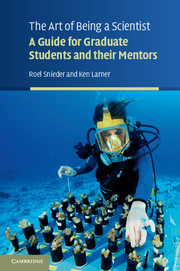Book contents
- Frontmatter
- Contents
- 1 Introduction
- 2 What is science?
- 3 Choices, choices, choices
- 4 The adviser and thesis committee
- 5 Questions drive research
- 6 Giving direction to our work
- 7 Turning challenges into opportunities
- 8 Ethics of research
- 9 Using the scientific literature
- 10 Communication
- 11 Publishing a paper
- 12 Time management
- 13 Writing proposals
- 14 The scientific career
- 15 Applying for a job
- 16 Concluding remarks
- Appendix A Further reading
- Appendix B A sample curriculum
- Appendix C The Refer and BibTeX format
- References
- About the authors
- Index
5 - Questions drive research
Published online by Cambridge University Press: 05 June 2014
- Frontmatter
- Contents
- 1 Introduction
- 2 What is science?
- 3 Choices, choices, choices
- 4 The adviser and thesis committee
- 5 Questions drive research
- 6 Giving direction to our work
- 7 Turning challenges into opportunities
- 8 Ethics of research
- 9 Using the scientific literature
- 10 Communication
- 11 Publishing a paper
- 12 Time management
- 13 Writing proposals
- 14 The scientific career
- 15 Applying for a job
- 16 Concluding remarks
- Appendix A Further reading
- Appendix B A sample curriculum
- Appendix C The Refer and BibTeX format
- References
- About the authors
- Index
Summary
In the theoretical physics community there are many more people who can answer well-posed questions than there are people who can pose the truly important questions. The latter type of physicist can invariably also do much of what the former can do, but the reverse is certainly not true.
Zee, 2003Many scientists (and non-scientists as well) live under the impression that they don't know much about research topics that lie outside those that occupy them on a daily basis. We often feel like a blank sheet of paper when it concerns such research topics. Perhaps we know more about various areas than we think. The path to ferreting out aspects that we do and don't know is lined with questions. For example, both of us authors are geophysicists, and (an understatement) we don't know much about biomedical research. Yet if we take a topic such as cell therapy, several statements (correct or incorrect, naïve or otherwise) about this area of research can readily bring a number of questions to our lay minds. A line of thinking might go as follows.
In cell therapy one seeks to modify the genetic material of cells in a body in order to correct the deviant behavior that causes a disease. The genetic material is stored in large molecules called DNA. Viruses modify the genetic material of cells. […]
- Type
- Chapter
- Information
- The Art of Being a ScientistA Guide for Graduate Students and their Mentors, pp. 65 - 80Publisher: Cambridge University PressPrint publication year: 2009



